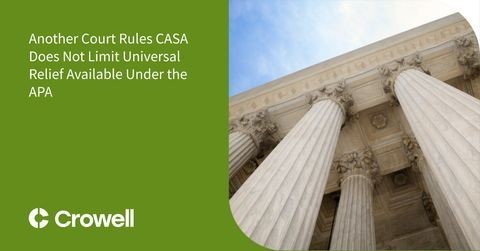Four Takeaways for In-House Counsel from the Dec. 1 Amendments to the Federal Rules
Client Alert | 3 min read | 12.03.15
On Tuesday December 1, new amendments to the Federal Rules of Civil Procedure went into effect. These amendments are designed to streamline discovery and notably: (i) introduce a new proportionality standard defining the scope of discovery (replacing the former relevance standard); (ii) require greater specificity when objecting to a discovery request; (iii) speed up litigation with shorter timelines; and (iv) establish sanctions for spoliation of electronically stored information.
1. New "Proportional" Discovery Standard
One of the most significant changes instituted by these amendments is to Rule 26(b)(1), which defines the scope of discovery. Now, instead of using the "reasonably calculated to lead to the discovery of admissible evidence" standard, the rule has been amended to incorporate a new proportionality requirement.
This should, in some cases, reduce the scope of what is discoverable and, correspondingly, the burden of discovery. At least that was the primary goal. At a minimum, the concept of proportionality will be litigated now in the context of motions to compel, or for a protective order, and should provide a new fertile ground to limit burdensome discovery in some cases.
2. New Specificity Requirement for Objecting to Document Requests
Rule 34(b)(2) now requires specificity when responding to document requests and identification of when otherwise responsive documents are withheld based on such objections. The purpose of this change is to provide the requesting party greater notice when otherwise responsive documents are withheld and on what grounds. This new objection specificity requirement should facilitate the earlier identification of meaningful discovery disputes. But it also can be expected to require more work in terms of collecting and reviewing documents before written responses and objections are prepared. In many instances, this may result in additional legal expenses earlier in the litigation.
3. Shortened Litigation Timeline
The amendments also shorten various time periods under the Rules, as set forth below, in order to speed up litigation.
|
Rule |
|
|
|
|
90 days |
120 days |
|
Judge to Issue Scheduling Order |
90 days after any defendant served |
|
|
Added |
|
|
|
Added |
|
Serve document requests after Rule 26(f) conference |
4. New Sanctions for Spoliation of Electronically Stored Information
Amended Rule 37(e) now expressly authorizes a court to sanction a party who, where there is pending or foreseeable litigation, loses electronically stored information that should have been preserved. If the party failed to take reasonable steps to preserve the information and it cannot be restored through additional discovery, the court:
- Upon finding prejudice to another party from loss of the information, may order measures no greater than necessary to cure the prejudice; or
- only upon finding that the party acted with the intent to deprive another party of the information’s use in the litigation may:
(a) Presume that the lost information was unfavorable to the party;
(b) Instruct the jury that it may or must presume the information was unfavorable to the party; or
(c) Dismiss the action or enter a default judgment.This new sanction authority under the Rules should place even more emphasis on effective internal policies and practices concerning the effectuation and documentation of litigation holds and the collection and preservation of electronically stored information. Where documents are lost or not successfully preserved, the issue of intent will be critical. Considering the harsh remedies for intentional spoliation under these amendments, it will be important to be able to document and prove when these issues are litigated that reasonable polices were in place and reasonable steps were taken such that any loss or failure to preserve was inadvertent.
Contacts
Insights
Client Alert | 3 min read | 01.05.26
Another Court Rules CASA Does Not Limit Universal Relief Available Under the APA
In Trump v. CASA, the Supreme Court significantly constrained the equitable authority of federal district courts to grant universal or nationwide injunctive relief, clarifying that, with specific exceptions, a federal court’s power to grant relief is limited to the parties before it. When it was issued, many bemoaned CASA’s implications for preventing government overreach.
Client Alert | 7 min read | 01.05.26
Consideration of Artificial Intelligence in Arbitration Terms of Reference
Client Alert | 4 min read | 12.31.25
Raising the Bar: New York Expands Consumer Protection Law with FAIR Business Practices Act
Client Alert | 4 min read | 12.30.25



